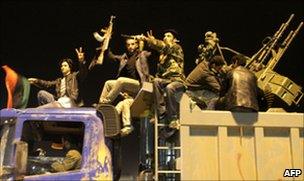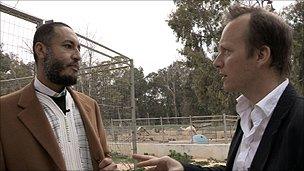Saadi Gaddafi 'gave order to shoot' in Benghazi revolt
- Published

Benghazi, Libya's second city, is the anti-government rebels' stronghold
One of Col Gaddafi's sons has denied an eyewitness claim he personally ordered soldiers in Benghazi to shoot at unarmed demonstrators.
Saadi Gaddafi was sent to Benghazi in response to the protests in the city in which more than 200 civilians died.
A veteran Libyan soldier told the BBC that Saadi Gaddafi came to the city's barracks where he gave orders to fire if protests continued.
"I heard Saadi say with my own ears, I swear to God," said the soldier.
"He didn't give the order to shoot that day. He said to give them one more day and then if nothing changes the next day, fire on them.
"When he went into the management office and came out, we gathered around him, the officers gathered as well. We created a circle around him, with him in the middle."
After the instructions were given, there was cheering, said the soldier, who had 18 years' service in the army and identified himself to a team from the BBC TV Panorama programme.
"I'm not saying the whole army did that, only the ones surrounding him. Most of them belonged to the Gaddafi family and their supporters."
'Very unsafe'
The following day, crowds returned to the army base, seen by demonstrators as a symbol of Gaddafi oppression.
Some threw stones at the barracks and the soldiers responded by shooting.

Saadi Gaddafi spoke to Panorama's Paul Kenyon
Saadi Gaddafi, who has an army rank of colonel, confirmed to Panorama that he visited the barracks, but denied ordering soldiers to open fire on protesters.
"My father sent me at the beginning of the crisis, sent me to go to talk with the people there and see what their demands are.
"And then they start attacking the barracks and the police stations. And then they took the weapons so then I have to leave, you know, because it's very unsafe."
Asked why he went to the barracks, he said "because we have a house there", denying that he addressed the troops. "No, that's not my job," he stated.
Violent scenes
Challenged that someone must have given the orders to shoot, he said: "When those guys came with the weapons, they wanted to attack the barracks.
"Of course, they were going to get in and kill the soldiers. So they have to defend."
Panorama has been shown mobile phone footage showing violent scenes on the streets of Benghazi. Unarmed protesters, mainly young people, can be seen hiding behind cars as gunfire is heard.
Some of the pictures show bodies blown apart, supporting claims that heavy weapons such as anti-aircraft guns were used on the crowds.
As the demonstrations continued, increasingly the protesters armed themselves including Ibrahim, who took part in the protests.
"We have benzene, you know gas, in bottles and we fire and we throw at them," he said. "If we explode the barracks, it means we will liberate Benghazi."
Bulldozers were commandeered by protesters to ram the walls but the barracks finally fell only when a suicide bomber drove a car into the front gate.
Interviewed before the recent UN resolution authorising international military action, the Libyan leader's son made clear the regime's ambition to put down the revolt in Benghazi.
"The priority now for the Libyan people and for the government is to restore the security to Benghazi," said Saadi Gaddafi.
"But those gangs, those mobs with the weapons, we don't want to see them in Libya any more."
The International Criminal Court's chief prosecutor recently declared he will investigate Libyan leader Muammar Gaddafi, his sons and senior aides for crimes against humanity.
Panorama: Fighting Gaddafi will be broadcast on Monday 21 March at 2030 GMT.